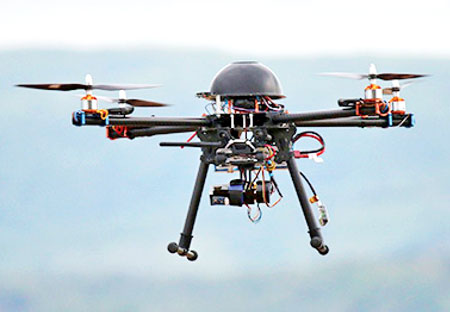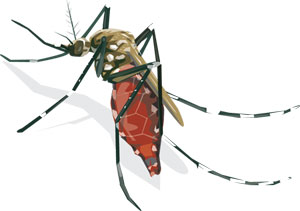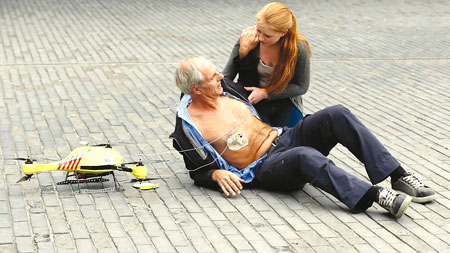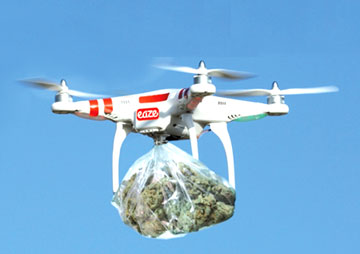Drones to fight water borne disease
by Carol Aloysius
 From weapons of war to assessing crop health; from tracking exact
locations of the tiny dengue and Zika carrying Aedes Aegpti mosquito, to
physical interventions in safeguarding crop health, drone technology has
come a long way in its chequered history. And, while the technology
itself is not new, it has certainly crossed traditional thresholds
pressured by the demands of modern society. From weapons of war to assessing crop health; from tracking exact
locations of the tiny dengue and Zika carrying Aedes Aegpti mosquito, to
physical interventions in safeguarding crop health, drone technology has
come a long way in its chequered history. And, while the technology
itself is not new, it has certainly crossed traditional thresholds
pressured by the demands of modern society.
Take agricultural practices which they are increasingly targeting
worldwide. The technology has revolutionized conventional practices to
the extent that, today, in many countries farmers and agricultural
experts are increasingly using it to assess the state of their crop
health and increase productivity.
Precise imaging
How is this possible? Manju Gunewardene who heads a private company
engaged in advanced agriculture applications ( CIC), which has recently
launched the first project to mark the entry of drone technology in
agriculture in Sri Lanka, explained: "With advanced sensors and precise
imaging capability, equipped with tiny cameras, they are able to detect,
both, healthy and distressed plants in a way the naked eye cannot. The
benefits of this technology is that they are able to help plantation
owners and farmers to define soil defects, soil erosion , nitrogen
deficiency and intervene accordingly", he said.
Speaking to the Sunday Observer in a telephone interview from
Polonnaruwa , Tuesday, he shared some of his hands on experiences,
giving us insights into how the new technology was capable of
dramatically improving agricultural practices in the country, and most
importantly, be used as an effective intervention tool in the current
war against Dengue and Zika.
"We don't sell instruments to do this. We provide our services to
anyone who wants them", he stressed.
How? we asked. Examples
 "With the special software designed specifically for the task we have
in mind. Take the case of a sugar plantation. With the data we have, we
can define areas of the quality of soil, the defects that can prevent
produce from reaching their full potential, such as, soil erosion,
nitrogen deficiency, loss of plant height and plant loss. This data will
be useful for farmers to intervene accordingly. "With the special software designed specifically for the task we have
in mind. Take the case of a sugar plantation. With the data we have, we
can define areas of the quality of soil, the defects that can prevent
produce from reaching their full potential, such as, soil erosion,
nitrogen deficiency, loss of plant height and plant loss. This data will
be useful for farmers to intervene accordingly.
Besides providing data , we can go in and intervene physically if
necessary with drone sprays. If for example, there is a nitrogen
deficiency, we can go to that particular area with drones that can apply
(spray) the fertilizer as well.", he said.
Defence
So how will the new technology be used to fight the dengue war?
He explained that the drone technology, originally called Project
Premonition, was an early line of defence from the Zika infected
mosquitoes in Florida, USA. It could be used to track and trap these
diseases in 64 smart cells each of which monitors the insects flying
into it.
If the wing movements of an insect match those of a mosquito , then a
cell can close a door, capturing the insect and tagging with key
environmental data, including time, temperature and light levels. "The
trap can learn from its mistakes to become more efficient and is
designed to run for more than 20 hours in hot humid environments, such
as ours".
"Though we are introducing this for the first time in a South Asian
country, it is used by most countries abroad", he said, adding that
while drone technology was not being used in the health sector at
present, " There is a huge possibility for using it, especially, in
fighting communicable diseases like Dengue and Zika in the future"..
Dengue Control Unit's response
 Does the Dengue Control Unit agree with his views? Does the Dengue Control Unit agree with his views?
Only up to a point.
Explaining why she did not fully agree, Community Physician Dr
Preshilla Samaraweera told the Sunday Observer, "Drones would be ideal
in high rise buildings as a means of surveillance. But our problem is
that 99 percent of our mosquito breeding sites are on ground level.
People can thus easily see for themselves exactly where the breeding
sites are located. They don't need drones to do this for them.
The trouble is, although they are aware of the existence of the
breeding sites, they are not fully co-operating with us in eliminating
the sites. It has to be an on going process."
She further noted, the Dengue Control Unit had set up an excellent
surveillance system with regard to confirmed dengue patients and the
areas from where they were being admitted. "All our hospitals are
interconnected by this system and each hospital knows how many patients
have been admitted, and from where. So, at present, we don't need drones
for mosquito surveillance. As I said, most of the sites are in and
around buildings at ground level , whether office, government
institutes, schools, religious places, or hospitals. What is needed is
community action and responsible behaviour of owners of these breeding
sites, and a change in their attitude to eliminating Dengue. The
Ministry can't handle this task alone. We need everyone's co-operation".
App to fight dengue
Meanwhile, Vetal Life , a technology start up, has also stepped in,
to address the issue of mosquito-borne diseases such as, Dengue and Zika
spreading in Sri Lanka,.
 Pradeepan, a spokesman for the company quoting Health Ministry
statistics, said " In the first eight months of this year alone, over
38,000 cases of Dengue have been reported along with over 50 Dengue
related deaths. Furthermore, since the identical mosquito spreads Dengue
and Zika, the emerging disease Zika could pose a significant risk to Sri
Lanka as well. Pradeepan, a spokesman for the company quoting Health Ministry
statistics, said " In the first eight months of this year alone, over
38,000 cases of Dengue have been reported along with over 50 Dengue
related deaths. Furthermore, since the identical mosquito spreads Dengue
and Zika, the emerging disease Zika could pose a significant risk to Sri
Lanka as well.
Since the lack of co-operation by the public is an issue, the App
launched by Veta, has a set of features which can hopefully address the
lack of interest by the public which accounts for the surge in mosquito
breeding sites, the biggest cause for dengue outbreak."
Explaining how this was possible, he said, "The App allows
individuals to set locations frequently used by them and their families,
for instance, their home, office or the child's school. Along with these
frequented locations, users can also set an alert radius, across which
the set locations need to be monitored for cases.
The App also allows users to report cases of Dengue along with the
incident location and this in-turn will serve as an alert to other users
in close proximity to that location. The benefit of the App is, it will
enable users to exercise greater vigilance, and take extra safeguards in
any location that has a relatively higher number of reported incidents.
By making it personal, Veta believes, people will start taking mosquito
breeding sites more seriously, before it impacts one's own family," he
said.
 "With an understandable design that allows new users to easily
navigate the App and instantly figure out how to use it, Veta is hopeful
that even simple users of smartphones will be able to comfortably use
the App.", he added. "With an understandable design that allows new users to easily
navigate the App and instantly figure out how to use it, Veta is hopeful
that even simple users of smartphones will be able to comfortably use
the App.", he added.
"Given the Smartphone penetration growth in Sri Lanka, there are
greater benefits in mobilizing the public and collecting this data. For
instance, analysis of user reports may reveal patterns and enable
authorities, who are often faced with limited resources, to focus their
efforts while dealing with epidemics, he pointed out.
The App (available for Android and iOS devices) is free to the Sri
Lankan public, and can be viewed on Veta's website www.veta.life
Dengue Control Unit's reaction
Asked her views on the practicality of using App smartphones as a
means of intervention in the dengue war, Dr Samaraweera told the Sunday
Observer, while agreeing that App technology could help in reducing
mosquito breeding sites by alerting dengue breeders , it was important
that the Apps used, were community based " We need Apps that can be used
by the PHI who can upload the data to share, when he goes into the field
. If not, they may not serve the purpose".
Quick to respond, Veta life spokesman Pradeepan said, "All our Apps
are community based. Whether it is the PHI or a non health person,
anyone who has a basic smartphone can use it to detect the nearest
dengue breeding site. There is no distinction when it comes to using
this application", he added.
Commenting on the limited number of Public Health Inspectors
available in the country, he observed, "Since it is physically
impossible for one PHI to oversee more than one or two areas depending
on its size, the use of smartphones to do the same job would in my
opinion be a useful complementary instrument for the Health Ministry in
its dengue control programs. Furthermore, our App will be able to alert
neighbours of a possible nearby dengue breeding site , even after the
visit of the PHI , to initiate immediate action."
What do our readers say?
Send your views to the editor@[email protected] |

